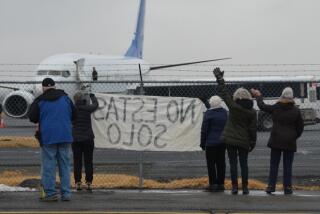U.S. Cannot Find Many Resident Aliens, Investigation Finds
WASHINGTON — The government could not locate nearly half the 4,112 resident aliens whom authorities wanted to talk to after the Sept. 11 attacks, congressional investigators said Thursday.
The Immigration and Naturalization Service did not have the current addresses of 1,851 people, according to the General Accounting Office, the investigative arm of Congress.
The INS either failed to tell those people that they had to alert the agency when they moved or did not enforce the requirement.
The report is the latest in a string of post-Sept. 11 criticism aimed at the INS, which will be abolished when its functions are transferred to the new Homeland Security Department.
“This finding should not be shocking to anyone,” said Rep. John Conyers Jr. of Michigan, the top Democrat on the House Judiciary Committee. “The better use of technology, along with a better public information campaign, could go a long way toward solving this problem. Congress must continue its very close scrutiny to ensure that the immigration system serves the needs of both immigrants and the law enforcement community.”
Since the attacks, the INS has sought ways to better track foreign visitors. Fifteen of the 19 Sept. 11 hijackers entered the United States legally on travel visas. Three were admitted with business visas. The 19th entered on a student visa.
“It’s a question of the agency being overwhelmed,” said Steven Camarota, research director for the Center for Immigration Studies, a nonpartisan research group that supports some limits on immigration.
Foreigners arriving in the United States for extended stays must report their address to the government. The list includes permanent residents who are not citizens. They are supposed to let the INS know within 10 days of a move, but many may not know this because the agency does not publicize the requirement, the GAO said. Others simply ignore the rules because the agency has not enforced the regulation for almost three decades, the report said.
“It’s equivalent to not returning a library book on time,” said Angela Kelley, deputy director of the National Immigration Forum, a pro-immigration group. “It’s something that most perfectly legal immigrants know nothing about. You have to question whether this is where the INS should put its enforcement.”
Atty. Gen. John Ashcroft proposed rules in July to help the INS begin enforcing the law. The subsequent deluge of change-of-address forms overwhelmed the INS’ ability to update its records, agency officials said.
INS officials said they received 500,000 forms and hired a private contractor to help them update their records. They said they hoped to eliminate the backlog by mid-January.
In a written response to the GAO report, Robert Diegelman, acting assistant attorney general for the administration, agreed with most of the report’s findings but said U.S. attorneys’ offices did not have the time to prosecute minor offenses such as failing to file change of address forms. The maximum penalty is 30 days in jail and a $200 fine, he said.
“If enforcement of the requirement to file a notice of change of address is to be effective, these penalties would need to be substantially increased,” Diegelman wrote. “Only then will a change in operating procedures and referring cases to the United States attorneys be effective.”
More to Read
Sign up for Essential California
The most important California stories and recommendations in your inbox every morning.
You may occasionally receive promotional content from the Los Angeles Times.










